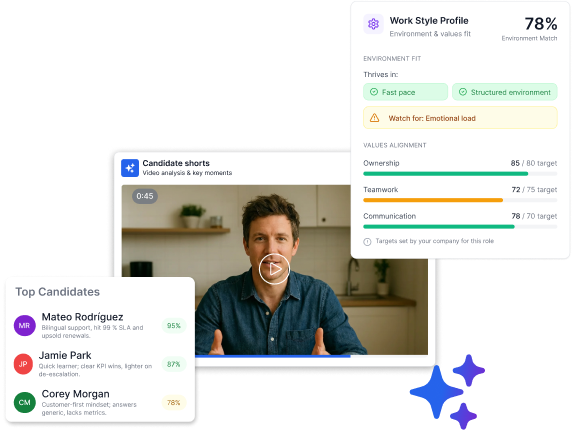Spotting a bad hire before they are on payroll is part instinct, part discipline.
Some red flags like lying or being rude are obvious. Others are easier to miss in a short call or even across several interview rounds. And when you are moving fast, it is tempting to overlook behavior that might just be nerves or poor communication.
The goal is not to eliminate everyone who stumbles. It is to watch for patterns that tend to signal risk. Here is what seasoned hiring managers and recruiters consistently flag as early warning signs.
1. They are late, unprepared, or reschedule last minute
Being five minutes late might not matter on its own. But combine it with weak excuses or signs they did not review the job description, and it raises a question: how seriously are they taking this?
One candidate literally answered a scheduled phone screen while still half asleep. That interview ended quickly.
What to watch for:
- Missed or rescheduled interviews without valid reasons
- Confusion about who they are meeting or what the role involves
- Low energy or signs of poor preparation
2. They are hard to engage or pin down
Some candidates are difficult to reach, slow to respond, or vague about their availability. They avoid committing to next steps or sidestep basic questions like salary expectations.
While this might come from caution or competing offers, it often signals disinterest or potential difficulty down the line.
What to watch for:
- Poor responsiveness to emails or calls
- Limited scheduling availability
- Evasive language or vague answers
3. Their résumé shows unexplained job hopping
Candidates do not need perfect career arcs. But six jobs in five years, all in unrelated industries, with no clear trajectory? That is a pattern.
Job hopping can be strategic when done with intent. Too much instability without explanation creates concerns about commitment and performance.
What to watch for:
- Multiple short-term roles under 12 months
- Industry-hopping with no clear connection
- Lateral moves without upward momentum
4. Their experience does not match their résumé
Keyword stuffing is common. But if a candidate claims to have led Salesforce integrations and cannot explain the basics, you are not looking at exaggeration. You are looking at dishonesty.
Once one detail falls apart, trust in the entire résumé weakens.
What to watch for:
- Overstated technical or leadership claims
- Gaps between written and spoken experience
- Weak performance in assessments or deep-dive questions
5. They get caught in a lie
Whether it is about their last job, their title, or their responsibilities, lies unravel fast. You do not need to interrogate. Just ask a few thoughtful follow-ups.
Candidates with real experience will speak with clarity. Fabricators will not.
What to watch for:
- Contradictions between documents and conversation
- Overly vague or defensive answers
- Shifting stories as interviews progress
6. They badmouth former employers
Even if they are telling the truth, badmouthing former bosses or teams is a red flag. It suggests poor self-awareness and a tendency to deflect blame.
Hiring someone who sees themselves as the victim in every story is a risky move.
What to watch for:
- Emotional complaints without personal reflection
- Multiple stories of toxic work environments
- No learnings or constructive takeaways
7. They are too casual
Being relaxed is fine. Being disrespectful is not.
Candidates who call you "boss" or "bro," make off-color jokes, or treat the interview like a hangout are not reading the room.
What to watch for:
- Unprofessional language or tone
- Lack of seriousness in body language or responses
- Signs they are not taking the process seriously
8. They treat coordinators or admins poorly
This one is critical.
If a candidate is rude to your receptionist, difficult with your coordinator, or dismissive toward anyone not on the hiring panel, assume they will treat your team the same way.
What to watch for:
- Complaints from support staff
- Arrogance during scheduling or logistics
- Ignoring or speaking over junior employees
9. Their salary expectations are unrealistic
Everyone wants to earn more. But if a candidate asks for 30 or 40 percent above market with no rationale, it signals a lack of understanding or a bait-and-switch tactic.
Especially if their number changes at the offer stage.
What to watch for:
- Salary demands far beyond market rate
- No clear justification for the ask
- Big shifts from initial discussions to offer stage
10. They never take accountability
In behavioral or WHO interviews, pay attention to how they talk about failure. If every problem was someone else's fault and they never reflect on their role, that is a concern.
Strong candidates own mistakes and show growth. Weak ones deflect and defuse.
What to watch for:
- Stories where they are always the victim or hero
- No mention of lessons learned
- Avoidance of responsibility
11. They rely on charm instead of preparation
Some candidates lean hard on personality. They show up unprepared, ask no questions, and assume confidence is enough.
This can work in early rounds but almost never translates to performance.
What to watch for:
- No specific questions about the role or team
- Buzzwords in place of substance
- Little clarity on what they want or why they applied
How one-way interviews help spot red flags sooner
Red flags are not always obvious in a résumé or even during a live interview. That is where one-way interview software gives hiring teams a clear advantage.
Because they are structured, repeatable, and asynchronous, one-way interviews provide a consistent window into how a candidate thinks, communicates, and prepares. There is no small talk or social charm to mask weak answers.
Here is what you can identify early with one-way responses:
- Lack of preparation: Candidates who record their answers while reading from a script or improvising often have not invested any real effort.
- Poor communication skills: Rambling, vague, or off-topic answers stand out clearly when everyone responds to the same questions in the same format.
- Inconsistent stories: If the résumé lists leadership experience but their examples show no sign of managing people, the mismatch is obvious.
- Disrespect for the process: Late submissions, sloppy presentation, or low-effort engagement reflect how much the candidate values the opportunity.
And since the responses are recorded, you can review them as a team and get a second opinion without relying on memory or gut instinct.
One-way interviews are not just a time-saver. They reveal patterns and red flags before you waste energy moving the wrong candidates forward.
The wrap on red flag candidates
Not every red flag is a deal breaker. But when two or three start stacking up, it is a sign to pause.
Your job is not just to assess skills. It is to protect your team. Hiring someone with the wrong attitude or mindset costs more than just time. It affects morale, trust, and output.
Be rigorous, not ruthless. Give people space to explain—but trust your instincts when the same signals show up again and again. The best hires are not only competent. They make your team better just by joining it.



